Investing in solar panels offers homeowners a variety of financial benefits, from lower energy costs to increased property values. However, when you’re reviewing solar system quotes for the first time, there can be some sticker shock associated with solar panel costs that could run up to $40,000.
There’s much more to the typical quote than just the cost of panels. Don’t risk compromising your investment with a hasty decision to buy cheap panels — they could cost you significantly more over the life of your system. Here’s a closer look at why premium panels are a smart investment and how to decide what’s right for you.
Consider the cost of the total system
When you’re reviewing the total value of installing solar panels, it’s important to remember how the economics of that initial quote break down, advises Dan Glaser, a sales engineer and solar industry expert with Panasonic. Solar panels are just one part of the expense of installing a home solar system.
The quote will include costs for the solar panels, the balance of the system, installation labor, permits, and inspection fees. Choosing cheaper solar panels may ultimately only save homeowners $1,000 to $2,000 from total project costs while increasing the potential for risk, performance issues, faster degradation, and other long-term costs of ownership.
Don’t assume cheaper panels impact affordability
According to the U.S. Department of Energy, the cost of installing solar systems has decreased, making it easier to invest in a premium system. Affordability is a complex question homeowners need to consider from multiple dimensions. The initial cost to install the system is just one part of the total costs of ownership. Buyers must also think about the financial impact of warranties, long-term power output, energy savings, and any federal or state solar incentives they receive. Each of these can help make a solar system more affordable. In addition, one study found that buyers were willing to spend up to $15,000 for a property with solar upgrades.
Glaser also notes that solar purchases are often funded through loans. Consider a $30,000 system that’s funded through a 10-year loan. Monthly payments on that would be roughly $250, plus interest. Opting for lower-end panels might save $2,000 off the total project costs. But the monthly payment would only drop to $233, plus interest. The small savings from choosing less expensive panels can quickly be eroded over the long term from the higher total ownership costs associated with untested and underperforming systems.
Assess the risks of less expensive solar panels
Lower-cost solar panels are often developed by introducing newer and less expensive types of materials into their construction. In many cases, these materials are untested and may even pose a risk to your home’s safety. Glaser notes that the scenarios from untested materials range from an increased risk of system failure to the catastrophic potential of issues such as roof fire. Don’t endanger your investment or your home for anything less than a safe, time-tested product.
The residential solar industry has been in business for about five decades. Trusted names like Panasonic have more than 40 years invested in research and development. They have extensive experience with developing state-of-the-art solar panels and many years of testing and understanding how those materials perform over time and in a wide range of weather conditions.
Evaluate a company’s reputation for warranty protection
Buying a solar system is a long-term investment. Your system should still be operational and producing power more than two decades from now. For example, a Panasonic premium solar panel will continue to operate at a 90.76% minimum power output for 25 years, ensuring less than 10% performance degradation over that time. Cheaper panels offer lower guarantees. In part, the value of your investment is protected by the warranties that are in place. As any educated consumer knows, a warranty’s value is related in part to the assurance you feel in having a trusted brand behind it.
Cheaper panels may be offered by startup companies. A startup may be offering a great deal now, but will they still be in business in five, 10, or 15 years? As Glaser notes, homeowners should take the long view when considering the value of a warranty. A system may perform well for a decade and then experience a failure. An established, trusted company will be ready to back up their warranty. In addition, established companies use networks of trusted installers who stand behind their work. Will the individual contractor or small business that installs your system still be in business or in your geographic area in a decade?
Don’t take a chance. Invest in premium panels from a brand you can trust for long-term peace of mind.
Investing in solar panels for your house has long-term financial benefits. As you’re evaluating initial quotes and the potential for long-term return on investment, it’s important to remember that the costs for solar panels are just one part of the equation. Try to find the most efficient solar panels in your budget. Rely on solar panel reviews. Choose the right system for your needs, and secure your investment by partnering with an established brand, demanding industry-leading warranties, and selecting solar panels with decades of strong performance behind them.





